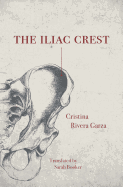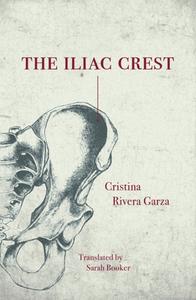
 Translated from the Spanish by Sarah Booker, The Iliac Crest by Cristina Rivera Garza is a slim volume that pushes the boundaries of the male-female spectrum, mental health and the stories one tells oneself and others. Two women visit an unidentified male narrator, a doctor who lives by the ocean; one is a former lover, the other a stranger who instills desire and fear in the narrator. Both women settle into a comfortable routine, leaving the doctor to ponder past, present and future aspects of his life. When these two women state they know his biggest secret--that he is in fact a woman--the narrator begins a downward spiral into a state of mental confusion and anxiety that pushes him to perform acts he might otherwise avoid.
Translated from the Spanish by Sarah Booker, The Iliac Crest by Cristina Rivera Garza is a slim volume that pushes the boundaries of the male-female spectrum, mental health and the stories one tells oneself and others. Two women visit an unidentified male narrator, a doctor who lives by the ocean; one is a former lover, the other a stranger who instills desire and fear in the narrator. Both women settle into a comfortable routine, leaving the doctor to ponder past, present and future aspects of his life. When these two women state they know his biggest secret--that he is in fact a woman--the narrator begins a downward spiral into a state of mental confusion and anxiety that pushes him to perform acts he might otherwise avoid.
Garza's work draws heavily on the writings of Amparo Dávila, a Mexican writer whose work revolves around female protagonists who often have mental illnesses. These often lead to violent and dangerous scenarios. Other themes both writers explore are death, ghosts and time. In The Iliac Crest, ghosts are prevalent. Time ebbs and flows between past and future--reflected in the motions of the ocean, a setting the narrator is drawn to time and again. "I watched the sea, her nocturnal silence, her immense mass.... How many [people] knew the ocean so intimately, savoring her without resentment, gradually learning not to fear her? I was almost euphoric, but contained myself.... I walked for hours. Lost. Lost in thought. Asking myself with every step if I was, really, alive." Multiple times, the narrator is forced to question his reality as the two women continue to share his house, creating an atmosphere that is both tense and erotic, a situation the man both wants to avoid and jump into with full force. This push-pull of ambivalence helps to spiral him outward into a deeper state of confusion, where he continues to question his own existence.
Although modest in length, Garza's creative piece is a complex puzzle that might take multiple readings to unravel fully. A background in Amparo Dávila's work would be useful, but it is certainly not necessary, as an afterword by Elena Poniatowska helps clarify some of their shared themes. Despite the novel's brevity, Booker's translation makes clear the intricate and delicate poetic dance Garza crafts among the three main characters. --Lee E. Cart, freelance writer and book reviewer
Shelf Talker: A complex tale of time, death and identity written by an outstanding Mexican woman is now available in English.

